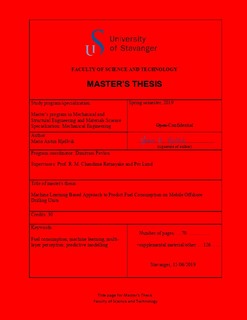| dc.contributor.advisor | Ratnayake, Chandima | |
| dc.contributor.advisor | Lund, Per | |
| dc.contributor.author | Hjellvik, Maria | |
| dc.date.accessioned | 2019-10-08T19:51:27Z | |
| dc.date.available | 2019-10-08T19:51:27Z | |
| dc.date.issued | 2019-06-15 | |
| dc.identifier.uri | http://hdl.handle.net/11250/2621038 | |
| dc.description | Master's thesis in Mechanical Engineering | nb_NO |
| dc.description.abstract | The use of machine learning models for optimization and improved decision-making has a great potential in the drilling industry. This thesis demonstrates a model for predicting fuel consumption on the Mobile Offshore Drilling Unit (MODU) Deepsea Atlantic, which is a semi-submersible drilling rig currently operating on the Fram field in the North Sea. A Multi-layer Perceptron (MLP) artificial neural network is proposed as a tool for setting fuel consumption related performance goals for offshore personnel on the MODU. A dashboard layout for presenting fuel related performance goals to offshore personnel based on the predictive model is also proposed in this thesis. This method for presenting performance goals is inspired by Equinor’s ”Perfect well” and Shell’s ”Drilling the Limit” performance philosophies. Implementing performance goals for offshore personnel has the potential to develop a pursuit of operational excellence through a collaborative and competitive mindset, and as a result lead to a significant improvement in fuel efficiency.
Operational modes, environmental and positional data have been used as input variables for the MLP model with a dataset split into an 80 % training set and a 20% testset for performance validation. The best results came with three hidden layers in the neural network architecture with 38 neurons in each hidden layer. The Adam solver performs better than the Stochastic Gradient Descent (SGD) solver for weight optimization, and the best α parameter for the L2 regularization term is 0.0001 with the Adam solver. The MLP regression model predicts the fuel consumption for the test set with a Root Mean Square Error (RMSE) of 0.0770. Results indicate that an artificial neural network and the MLP regressor is a suitable algorithm for predictive modelling of fuel consumption on a MODU. | nb_NO |
| dc.language.iso | eng | nb_NO |
| dc.publisher | University of Stavanger, Norway | nb_NO |
| dc.relation.ispartofseries | Masteroppgave/UIS-TN-IMBM/2019; | |
| dc.subject | materialteknologi | nb_NO |
| dc.subject | byggkonstruksjon | nb_NO |
| dc.subject | fuel consumption | nb_NO |
| dc.subject | machine learning | nb_NO |
| dc.subject | multi-layer perceptron | nb_NO |
| dc.subject | predictive modelling | nb_NO |
| dc.title | Machine Learning Based Approach to Predict Fuel Consumption on Mobile Offshore Drilling Units | nb_NO |
| dc.type | Master thesis | nb_NO |
| dc.subject.nsi | VDP::Technology: 500::Mechanical engineering: 570::Machine construction and engineering technology: 571 | nb_NO |
